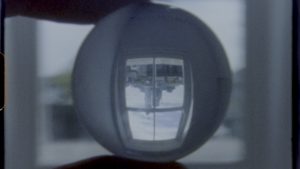Launch: Thursday 26 January 2017, 6-8pm
Venue: Centre for Chinese Contemporary Art (CFCCA), Market Buildings, Thomas Street, Northern Quarter, Manchester, M4 1EU
Exhibition dates: Friday 27 January – Sunday 30 April 2017
Gallery opening times: Tuesday – Sunday, 10am – 5pm
Admission: Free
In conversation: Thursday 16 February, 6-8pm at Centre for Chinese Contemporary Art
Artist Suki Chan in conversation with Dr Adam Galpin, Senior Lecturer in Psychology, University of Salford
Admission: Free
‘The more I investigated perception and how the brain processes information, the more miraculous and incredible it became: how impoverished and compressed information received via our senses can yield a coherent, high resolution, detailed and multi-dimensional world.’ Suki Chan
Weaving together extraordinary images, bio-medical research and individual testimonies, Lucida exposes the curious and complex relationship between the human eye, the brain and vision.
Working with a camera obscura, Chan became intrigued by how our eyes receive images upside down and yet the brain interprets them the right way up. The mechanisms of our visual perception mean that at any given moment we actually see much less than we perceive. Our everyday experience of viewing a perfect and stable image of the world with ‘photographic’ detail is, in a certain sense, an illusion.
Viewers will be invited to use eye-tracking technology to reveal their own rapid eye movements – something we are normally unaware of. The multi-screen installation will reveal how visual information is modified and processed by the eye and the brain in real time. Lucida is a visceral, visual journey in which Chan’s camera is constantly on the move, restlessly travelling through spaces that lead us, like a thread through a maze, into the heart of her subject. Partially filmed in the University of London’s Senate House, the fluid tracking shots through library spaces and boiler rooms suggest a visual analogy for the interior structures of our eyes and brains.
Lucida is Chan’s most ambitious and technically challenging work to date, and presents developing scientific theories about perception through a mesmerising cinematic experience. Chan regards her moving-image projects as installations as much as films, transforming the space and atmosphere into which the viewer enters. Her practice combines light, the moving image and sound to explore our physical and psychological experience of time and space, and her moving image works are notable for their dream-like aesthetic. Shifting between the micro and the macro, she draws the viewer into a cinematic ‘elsewhere’.
To create Lucida, Chan was supported by a Wellcome Trust arts award to work with ophthalmologists, neurobiologists, vision scientists and psychologists – and in particular has had the collaboration of vision scientist Colin Blakemore. Alongside the scientific framework, Chan interpolates personal narratives, such as the experiences of someone losing their sight. The work has a haunting soundtrack composed by Dominik Schrerrer, the winner of the 2014 Ivor Novello Award.
Lucida was commissioned by the University of Salford Art Collection and the Centre for Chinese Contemporary Art (CFCCA) in partnership with the Centre for the Study of the Senses, University of London and Tintype.
Lucida is supported by the Wellcome Trust Small Arts Award, University of Salford Art Collection and by Arts Council England.
A version of Lucida will enter the University of Salford Art Collection.



